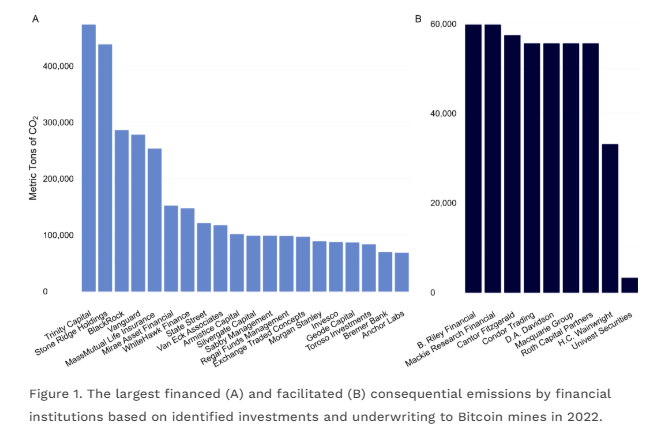The ever-growing popularity of cryptocurrencies has come under fire once again, this time due to their environmental costs. A new report from Greenpeace casts a critical eye on the energy consumption of Bitcoin mining, directly criticizing the Wall Street financiers who support the industry.
Wall Street’s dirty little secret?
The report argues that traditional financial institutions are deeply intertwined with the environmental impacts of Bitcoin mining. Bitcoin itself operates on a decentralized network, but the large-scale mining facilities needed to secure the currency are funded and backed by Wall Street giants.
The report said that despite the popular belief that Bitcoin is independent of traditional finance, the industry relies heavily on banks, asset managers and venture capitalists for the capital it needs to function.
Source: Greenpeace
Greenpeace has identified several major financial institutions, including BlackRock and Vanguard, as the top financial institutions for Bitcoin mining companies in 2022. The report calculates that these institutions, along with others, are indirectly responsible for more than 1.7 million metric tons of CO2 emissions. Annual electricity usage of hundreds of thousands of households.

Source: Greenpeace
Is Proof of Work the Problem?
The core of the environmental problem lies in Bitcoin’s core technology, Proof of Work (PoW). The system relies on a vast network of computers solving complex mathematical puzzles to verify transactions and secure the network. The more computing power you allocate to your network, the more secure it becomes, but it also comes with huge power demands.
Greenpeace argues that PoW systems are unsustainable in the face of climate change. They propose a switch to alternative consensus mechanisms, such as Proof-of-Stake, which use much less energy.
Total crypto market cap at $2.30 trillion on the daily chart: TradingView.com
But some industry experts warn against a hasty transition. Proof-of-Work has proven to be incredibly secure for Bitcoin over the years. Switching to a different system may introduce new vulnerabilities that you haven’t yet considered.
Searching for a Sustainable Future: Can Cryptocurrencies Go Green?
The debate surrounding Bitcoin’s environmental impact is not yet resolved. Greenpeace raises valid concerns about the role of Wall Street and the inherent energy inefficiencies of PoW, but there are other factors to consider as well.
Some Bitcoin mining companies are increasingly turning to renewable energy sources such as solar or geothermal power. Additionally, research is ongoing on how to optimize the PoW system itself to reduce energy usage.
The future of Bitcoin depends on several key actions. Miners and financial institutions must be more transparent about their energy use. It is important to explore new mining methods and regulate energy sources. The main challenge is to ensure that Bitcoin can grow without harming the environment.
Featured image by Greenpeace, chart by TradingView

